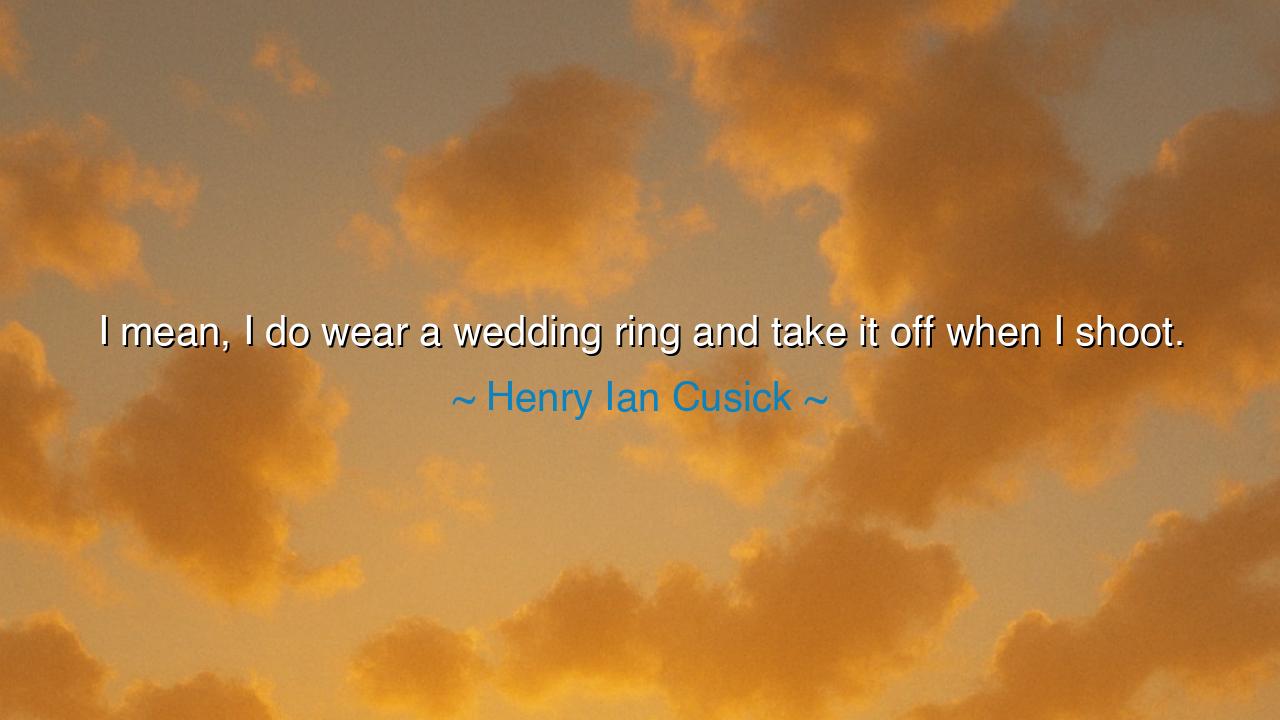
I mean, I do wear a wedding ring and take it off when I shoot.






In the words of Henry Ian Cusick—“I mean, I do wear a wedding ring and take it off when I shoot.”—there is revealed the delicate balance between the sacred world of private life and the shifting illusions of art. The wedding ring, small in form yet vast in meaning, is the eternal sign of covenant, a circle without end, proclaiming fidelity and love. Yet for the craft of the actor, the ring must sometimes be set aside, not out of disloyalty, but to honor the truth of a role.
The ancients understood that symbols must be treated with reverence, but also with wisdom. Consider the warriors of Sparta, who carried their shields into battle as tokens of honor. To abandon the shield was shameful, yet to lay it aside in the training ground was necessary, for discipline demanded freedom of movement. So too Cusick lays aside his ring when the story demands, not to dishonor his vow, but to fulfill the duty of his art.
This act speaks to the strength of identity. For a ring removed does not sever the bond, just as a crown laid aside does not erase a king’s sovereignty. The power of marriage rests not in gold, but in the heart’s vow, unseen and unbreakable. Cusick reminds us that symbols are precious, yet they live only because of the truth they represent. The actor who removes the ring for a role does not diminish love—he simply acknowledges that life contains many callings, each requiring its own form.
History gives us a mirror in Marcus Aurelius, emperor and philosopher. He wore the robes of state when governing Rome, yet set them aside when writing his Meditations, where he clothed himself in simplicity to commune with truth. His authority did not vanish with the robes, nor does Cusick’s devotion vanish with the removal of his ring. The external changes, but the inward bond remains unshaken.
Thus, let us learn: the strength of a covenant is not weakened when its symbol is momentarily removed. A wedding ring may leave the finger, but the promise does not leave the soul. In this balance between private vow and public duty lies the wisdom of life—that we may serve many roles, yet remain true at the core, where love, fidelity, and honor abide forever.






Ddang
Henry Ian Cusick’s practice of taking off his wedding ring before shooting reflects an interesting boundary between his personal life and his professional work. Is this a common practice among actors to help them focus more fully on their roles, or is it unique to him? How do these small acts of separation help an actor bring a character to life, and how important is it for an actor to maintain this level of detachment?
TPHoang Tuan Phong
Henry Ian Cusick’s choice to remove his wedding ring for his role brings attention to the often unseen sacrifices actors make to truly embody their characters. Does this gesture reflect a deeper commitment to the craft, or does it suggest that actors struggle to separate their personal identity from their professional roles? How do such decisions affect the emotional depth and authenticity an actor brings to a performance?
DTDuoc Thanh
It's interesting that Henry Ian Cusick takes off his wedding ring when he’s shooting. Does this signal a deeper need for actors to fully immerse themselves in their roles, or is it just a practical decision? How important is it for an actor to create a mental and physical separation from their real life to perform more authentically? Could such actions help actors avoid distractions or conflicting emotions during a shoot?
GHnguyen gia huy
Cusick’s mention of removing his wedding ring for shoots makes me wonder: how do such small personal adjustments influence an actor’s mindset during a performance? Is there a psychological aspect to distancing oneself from personal life, or is it simply a practical choice for the sake of authenticity? Do actors often feel the need to shed their personal symbols to better connect with the characters they’re playing?
Kkhang
Henry Ian Cusick’s decision to take off his wedding ring while shooting is a small but intriguing detail about the boundary between personal and professional life. Does removing such a personal item help actors immerse themselves in their roles, or is it more about respecting the character’s context? Should actors maintain a strong distinction between their private selves and their on-screen identities, or should the two blend more seamlessly?